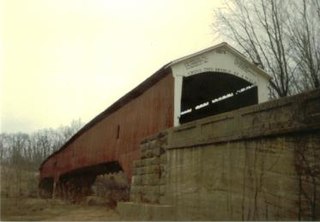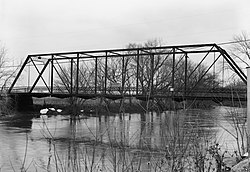
The National Road was the first major improved highway in the United States built by the federal government. Built between 1811 and 1837, the 620-mile (1,000 km) road connected the Potomac and Ohio Rivers and was a main transport path to the West for thousands of settlers. When improved in the 1830s, it became the second U.S. road surfaced with the macadam process pioneered by Scotsman John Loudon McAdam.
Historic ferries operated on rivers around Atlanta, Georgia area, and became namesakes for numerous current-day roads in north Georgia. Most of the ferries date to the early years of European-American settlement in the 1820s and 1830s, when parts of the region were still occupied by cherokee and other Native American communities.

The Bridal Veil Falls is a waterfall located on Bridal Veil Creek along the Columbia River Gorge in Multnomah County, Oregon, United States. The waterfall is accessible from the historic Columbia River Highway and Interstate 84. Spanning two tiers on basalt cliffs, it is the only waterfall which occurs below the historic Columbia Gorge Scenic Highway. The Bridal Veil Falls Bridge, built in 1914, crosses over the falls, and is listed on the National Register of Historic Places.

The Bollman Truss Railroad Bridge across the Little Patuxent River at Savage, Maryland, is one of the oldest standing iron railroad bridges in the United States and the sole surviving example of a revolutionary design in the history of American bridge engineering. The 160-foot (48.8 m) double-span was built in 1852 at an unknown location on the main line of the Baltimore and Ohio Railroad. It was moved 35 years later to its present location, where it replaced the very first Bollman bridge. Today, it carries the Savage Mill Trail.

U.S. Route 66 was a United States Numbered Highway in Illinois that connected St. Louis, Missouri, and Chicago, Illinois. The historic Route 66, the Mother Road or Main Street of America, took long distance automobile travelers from Chicago to Southern California. The highway had previously been Illinois Route 4 and the road has now been largely replaced with Interstate 55 (I-55). Parts of the road still carry traffic and six separate portions of the roadbed have been listed on the National Register of Historic Places.

The Babylon Bend Bridge is one of nine metal highway bridges in Fulton County, Illinois listed on the National Register of Historic Places and still standing. This bridge was built in 1890 over the Spoon River and is located along Illinois Route 123 near Ellisville. It was added to the National Register of Historic Places on October 29, 1980, along with the eight other bridges, as one of the "Metal Highway Bridges of Fulton County. Some of the other bridges included the now demolished Duncan Mills Bridge in Lewistown and the Indian Ford Bridge in London Mills, Illinois. In total, six of the nine bridges have been destroyed.
The Duncan Mills Bridge was one of nine metal highway bridges in Fulton County, Illinois nominated for the National Register of Historic Places. This particular one was located along west of Havana, Illinois near Lewistown. It was added to the National Register of Historic Places on October 29, 1980, along with the seven of the eight other bridges, as one of the "Metal Highway Bridges of Fulton County". Some of the other bridges include the now demolished Buckeye Bridge and the Tartar's Ferry Bridge, both near Smithfield.

The Indian Ford Bridge was one of nine metal highway bridges in Fulton County, Illinois listed on the National Register of Historic Places. This particular one was located along County Highway 20 as spans the Spoon River, 1.5 miles (2.4 km) southwest of London Mills. It was added to the National Register of Historic Places on October 29, 1980, along with the eight other bridges, as one of the "Metal Highway Bridges of Fulton County." Some of the other bridges included London Mill's only other Registered Historic Place, the now demolished London Mills Bridge. Other demolished bridges include the Elrod Bridge, Duncan Mills Bridge and Buckeye Bridge.

The Seville Bridge is one of nine metal highway bridges in Fulton County, Illinois that were listed on the National Register of Historic Places. This particular one is located across the Spoon River in Seville. It was added to the National Register of Historic Places on October 29, 1980, along with the eight other bridges, as one of the "Metal Highway Bridges of Fulton County. Some of the other bridges include the Buckeye Bridge, Tartar's Ferry Bridge and the Bernadotte Bridge, all in Smithfield. Five of the nine bridges have been demolished, though Seville Bridge still stands.

The Bernadotte Bridge at Bernadotte, built in 1910, is one of nine metal highway bridges in Fulton County, Illinois listed on the National Register of Historic Places. The bridge is located along County Route 2 between Smithfield, Illinois to the north, and Ipava, Illinois to the south. It was added to the National Register of Historic Places on October 29, 1980, along with the eight other bridges, as one of the "Metal Highway Bridges of Fulton County". The bridge is one of three near Smithfield listed on the Register, the others are the Buckeye Bridge and the Tartar's Ferry Bridge. A fourth bridge near the Smithfield was included on the Register but removed in 1996, following its 1995 destruction.

Buckeye Bridge also known as White's Ferry Bridge was one of nine metal highway bridges in Fulton County, Illinois once listed on the National Register of Historic Places. Buckeye is one of the five bridges that have been demolished out of nine similar bridges in the county. This particular one was over the Spoon River near Smithfield, Illinois. It was added to the National Register of Historic Places on October 29, 1980, along with the eight other bridges, as one of the "Metal Highway Bridges of Fulton County". The bridge was one of three near Smithfield listed on the Register, the others are the Bernadotte Bridge and the Tartar's Ferry Bridge. Others, such as the Babylon Bend Bridge in Ellisville, are located throughout the county. Another Smithfield area bridge, Elrod Bridge, was nominated with the original Multiple Property Submission but removed from the Register after its 1995 destruction by an F-4 tornado.

Tarter's Ferry Bridge was one of nine metal highway bridges in Fulton County, Illinois listed on the National Register of Historic Places. This particular one was a 9-panel Parker through truss that carried Tarter Ferry Road over the Spoon River near Smithfield, Illinois. It was added to the National Register of Historic Places on October 29, 1980, along with the eight other bridges, as one of the "Metal Highway Bridges of Fulton County. The bridge was one of three in Smithfield listed on the Register, the others are the Bernadotte Bridge and the destroyed Buckeye Bridge, as well as the demolished Elrod Bridge. Others, such as the Duncan Mills Bridge in Lewistown, are located throughout the county.

The Metal Highway Bridges of Fulton County Thematic Resources is the title for a Multiple Property Submission to the National Register of Historic Places in the U.S. state of Illinois. Originally the submission included nine separate bridges throughout Fulton County; however, since the Metal Highway Bridges' inclusion on the Register in 1980, more than half of those bridges have been destroyed.
Elrod Bridge was one of nine metal highway bridges in Fulton County, Illinois once listed on the National Register of Historic Places. It was listed from 1980 until 1995.

The West Union Covered Bridge formerly carried Tow Path Road over Sugar Creek north-northeast of Montezuma, Indiana. The two-span Burr Arch Truss covered bridge structure was built by Joseph J. Daniels in 1876. It is notable for being the longest standing covered bridge in Parke County, and one of the nation's best-preserved examples of the Burr truss.

The Dodd Ford Bridge is a bridge spanning the Blue Earth River about 1 mile (2 km) southwest of Amboy, Minnesota, in Blue Earth County, Minnesota.

The War Eagle Bridge is a historic bridge in War Eagle, Arkansas, United States, that is listed on the National Register of Historic Places.

The Pine Mill Bridge is an historic structure located in Wildcat Den State Park in rural Muscatine County, Iowa, United States. It was built in 1878 near the Pine Creek Gristmill, the only place in Iowa where a mill and bridge combination remains in place. The bridge was listed on the National Register of Historic Places in 1998 as a part of the Highway Bridges of Iowa MPS.

Best's Covered Bridge(akaSwallow's Bridge) is a historic covered bridge in West Windsor, Vermont, that carries Churchill Road over Mill Brook, just south of Vermont Route 44. Built in 1889, it is an architecturally distinctive laminated arch structure with a post-and-beam superstructure. It was listed on the National Register of Historic Places in 1973.

















